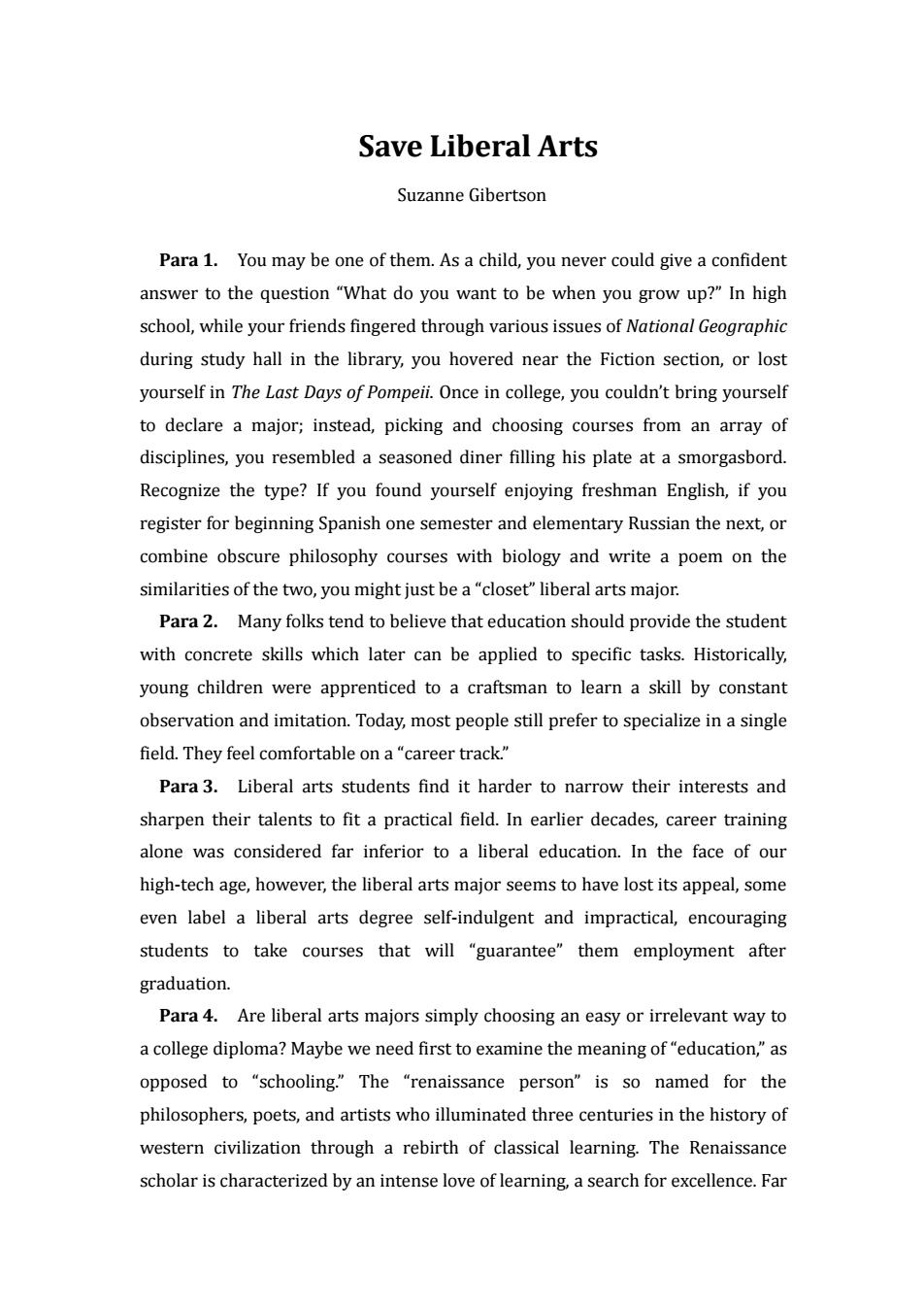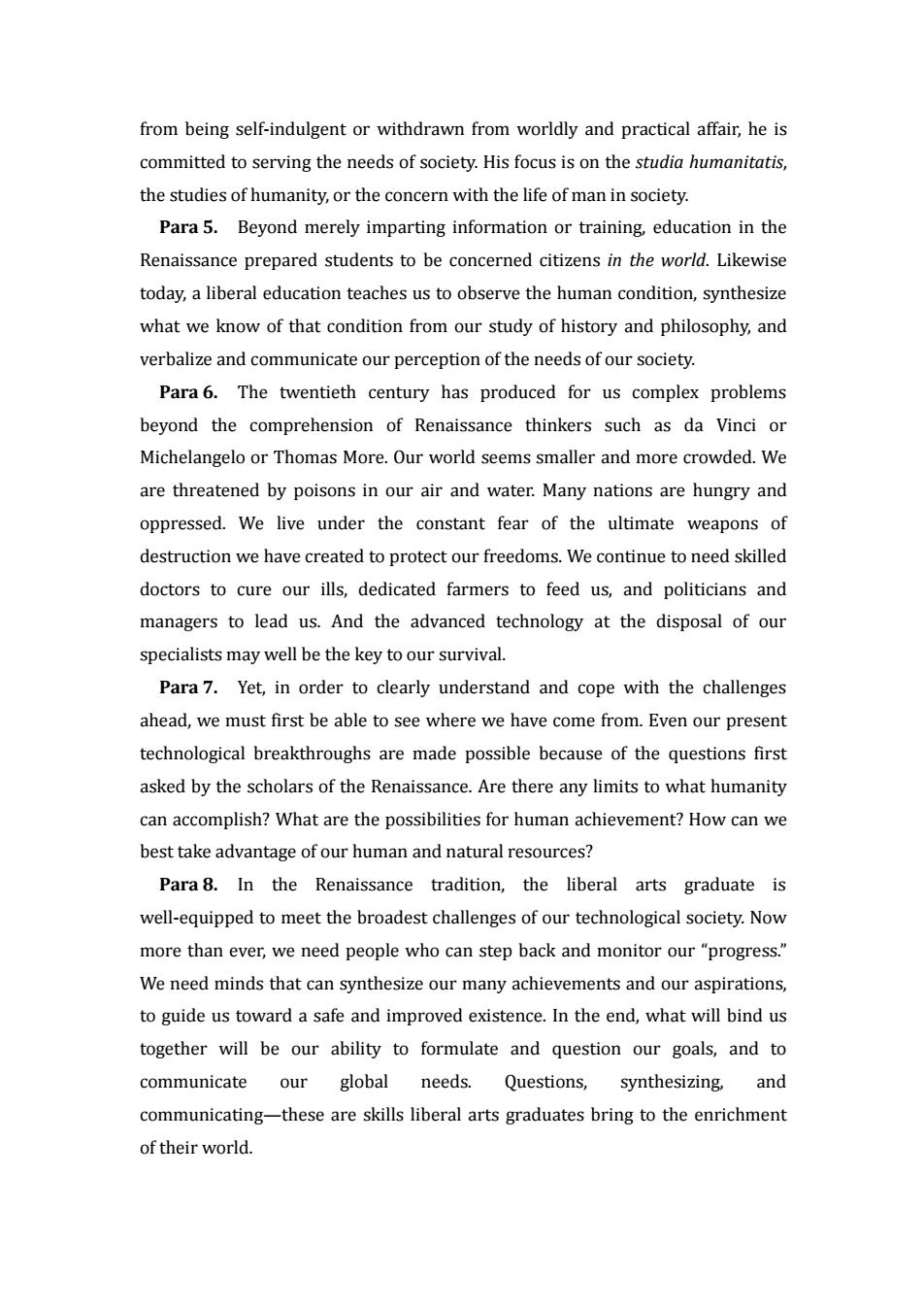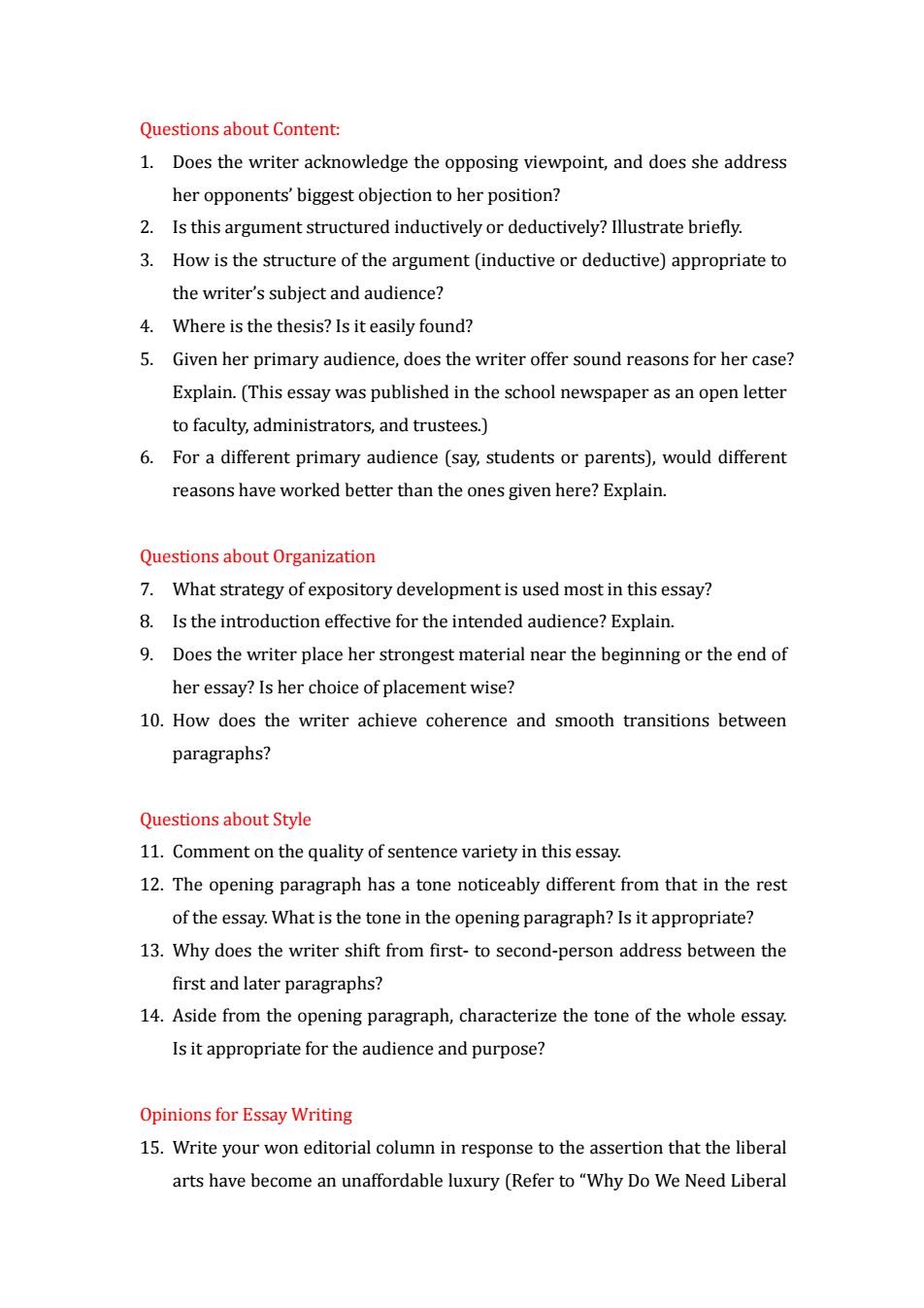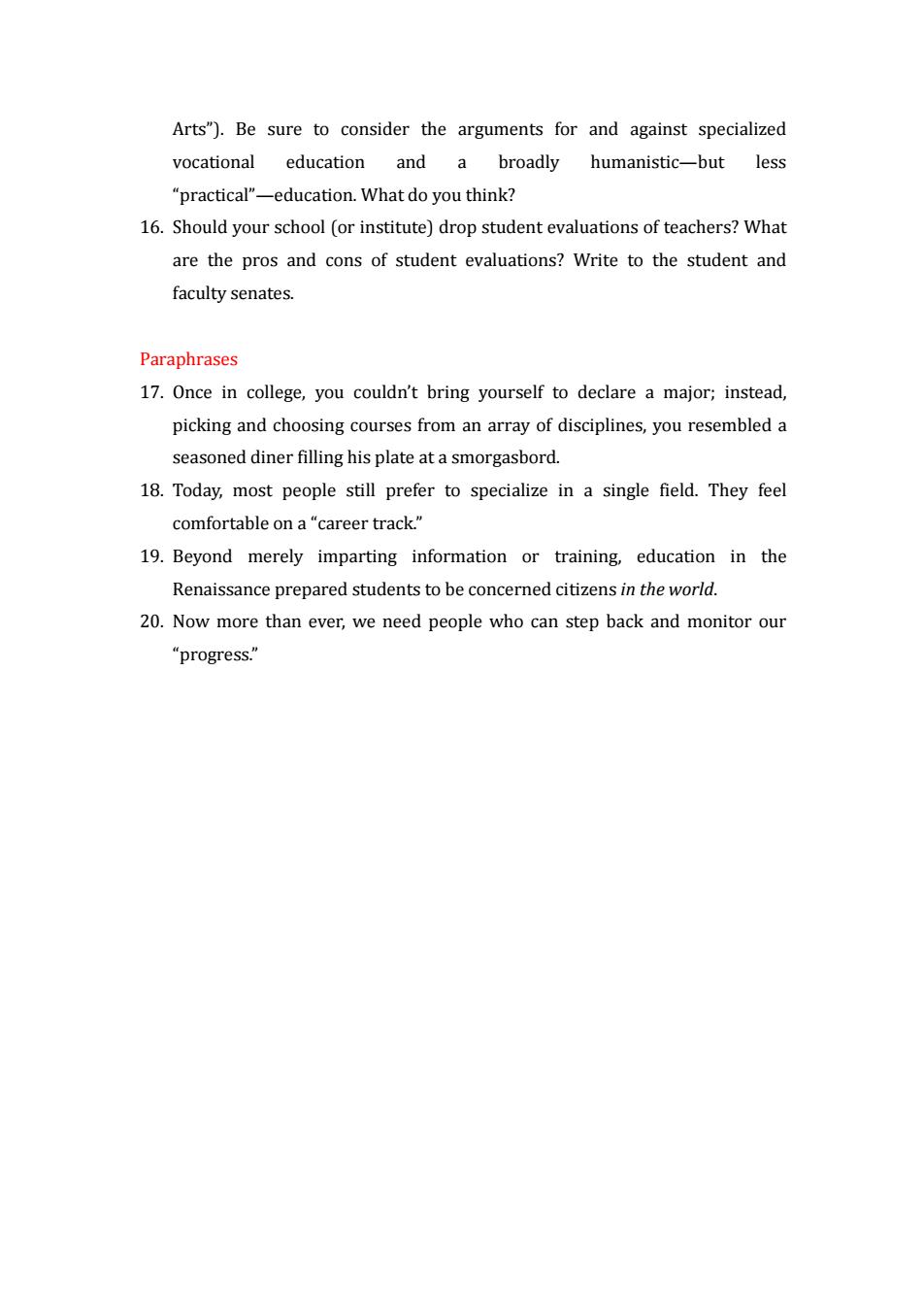
Save Liberal Arts Suzanne Gibertson Para 1.You may be one of them.As a child,you never could give a confident answer to the question "What do you want to be when you grow up?"In high school,while your friends fingered through various issues of National Geographic during study hall in the library,you hovered near the Fiction section,or lost yourself in The Last Days of Pompeii.Once in college,you couldn't bring yourself to declare a major;instead,picking and choosing courses from an array of disciplines,you resembled a seasoned diner filling his plate at a smorgasbord. Recognize the type?If you found yourself enjoying freshman English,if you register for beginning Spanish one semester and elementary Russian the next,or combine obscure philosophy courses with biology and write a poem on the similarities of the two,you might just be a "closet"liberal arts major. Para 2.Many folks tend to believe that education should provide the student with concrete skills which later can be applied to specific tasks.Historically, young children were apprenticed to a craftsman to learn a skill by constant observation and imitation.Today,most people still prefer to specialize in a single field.They feel comfortable on a"career track." Para 3.Liberal arts students find it harder to narrow their interests and sharpen their talents to fit a practical field.In earlier decades,career training alone was considered far inferior to a liberal education.In the face of our high-tech age,however,the liberal arts major seems to have lost its appeal,some even label a liberal arts degree self-indulgent and impractical,encouraging students to take courses that will "guarantee"them employment after graduation. Para 4.Are liberal arts majors simply choosing an easy or irrelevant way to a college diploma?Maybe we need first to examine the meaning of"education,"as opposed to“schooling.”The“renaissance person'”is so named for the philosophers,poets,and artists who illuminated three centuries in the history of western civilization through a rebirth of classical learning.The Renaissance scholar is characterized by an intense love of learning,a search for excellence.Far
Save Liberal Arts Suzanne Gibertson Para 1. You may be one of them. As a child, you never could give a confident answer to the question “What do you want to be when you grow up?” In high school, while your friends fingered through various issues of National Geographic during study hall in the library, you hovered near the Fiction section, or lost yourself in The Last Days of Pompeii. Once in college, you couldn’t bring yourself to declare a major; instead, picking and choosing courses from an array of disciplines, you resembled a seasoned diner filling his plate at a smorgasbord. Recognize the type? If you found yourself enjoying freshman English, if you register for beginning Spanish one semester and elementary Russian the next, or combine obscure philosophy courses with biology and write a poem on the similarities of the two, you might just be a “closet” liberal arts major. Para 2. Many folks tend to believe that education should provide the student with concrete skills which later can be applied to specific tasks. Historically, young children were apprenticed to a craftsman to learn a skill by constant observation and imitation. Today, most people still prefer to specialize in a single field. They feel comfortable on a “career track.” Para 3. Liberal arts students find it harder to narrow their interests and sharpen their talents to fit a practical field. In earlier decades, career training alone was considered far inferior to a liberal education. In the face of our high-tech age, however, the liberal arts major seems to have lost its appeal, some even label a liberal arts degree self-indulgent and impractical, encouraging students to take courses that will “guarantee” them employment after graduation. Para 4. Are liberal arts majors simply choosing an easy or irrelevant way to a college diploma? Maybe we need first to examine the meaning of “education,” as opposed to “schooling.” The “renaissance person” is so named for the philosophers, poets, and artists who illuminated three centuries in the history of western civilization through a rebirth of classical learning. The Renaissance scholar is characterized by an intense love of learning, a search for excellence. Far

from being self-indulgent or withdrawn from worldly and practical affair,he is committed to serving the needs of society.His focus is on the studia humanitatis, the studies of humanity,or the concern with the life of man in society. Para 5.Beyond merely imparting information or training,education in the Renaissance prepared students to be concerned citizens in the world.Likewise today,a liberal education teaches us to observe the human condition,synthesize what we know of that condition from our study of history and philosophy,and verbalize and communicate our perception of the needs of our society. Para 6.The twentieth century has produced for us complex problems beyond the comprehension of Renaissance thinkers such as da Vinci or Michelangelo or Thomas More.Our world seems smaller and more crowded.We are threatened by poisons in our air and water.Many nations are hungry and oppressed.We live under the constant fear of the ultimate weapons of destruction we have created to protect our freedoms.We continue to need skilled doctors to cure our ills,dedicated farmers to feed us,and politicians and managers to lead us.And the advanced technology at the disposal of our specialists may well be the key to our survival. Para 7.Yet,in order to clearly understand and cope with the challenges ahead,we must first be able to see where we have come from.Even our present technological breakthroughs are made possible because of the questions first asked by the scholars of the Renaissance.Are there any limits to what humanity can accomplish?What are the possibilities for human achievement?How can we best take advantage of our human and natural resources? Para 8.In the Renaissance tradition,the liberal arts graduate is well-equipped to meet the broadest challenges of our technological society.Now more than ever,we need people who can step back and monitor our "progress." We need minds that can synthesize our many achievements and our aspirations, to guide us toward a safe and improved existence.In the end,what will bind us together will be our ability to formulate and question our goals,and to communicate our global needs. Questions,synthesizing, and communicating-these are skills liberal arts graduates bring to the enrichment of their world
from being self-indulgent or withdrawn from worldly and practical affair, he is committed to serving the needs of society. His focus is on the studia humanitatis, the studies of humanity, or the concern with the life of man in society. Para 5. Beyond merely imparting information or training, education in the Renaissance prepared students to be concerned citizens in the world. Likewise today, a liberal education teaches us to observe the human condition, synthesize what we know of that condition from our study of history and philosophy, and verbalize and communicate our perception of the needs of our society. Para 6. The twentieth century has produced for us complex problems beyond the comprehension of Renaissance thinkers such as da Vinci or Michelangelo or Thomas More. Our world seems smaller and more crowded. We are threatened by poisons in our air and water. Many nations are hungry and oppressed. We live under the constant fear of the ultimate weapons of destruction we have created to protect our freedoms. We continue to need skilled doctors to cure our ills, dedicated farmers to feed us, and politicians and managers to lead us. And the advanced technology at the disposal of our specialists may well be the key to our survival. Para 7. Yet, in order to clearly understand and cope with the challenges ahead, we must first be able to see where we have come from. Even our present technological breakthroughs are made possible because of the questions first asked by the scholars of the Renaissance. Are there any limits to what humanity can accomplish? What are the possibilities for human achievement? How can we best take advantage of our human and natural resources? Para 8. In the Renaissance tradition, the liberal arts graduate is well-equipped to meet the broadest challenges of our technological society. Now more than ever, we need people who can step back and monitor our “progress.” We need minds that can synthesize our many achievements and our aspirations, to guide us toward a safe and improved existence. In the end, what will bind us together will be our ability to formulate and question our goals, and to communicate our global needs. Questions, synthesizing, and communicating—these are skills liberal arts graduates bring to the enrichment of their world

Questions about Content: 1.Does the writer acknowledge the opposing viewpoint,and does she address her opponents'biggest objection to her position? 2.Is this argument structured inductively or deductively?Illustrate briefly. 3.How is the structure of the argument(inductive or deductive)appropriate to the writer's subject and audience? 4.Where is the thesis?Is it easily found? 5.Given her primary audience,does the writer offer sound reasons for her case? Explain.(This essay was published in the school newspaper as an open letter to faculty,administrators,and trustees.) 6.For a different primary audience (say,students or parents),would different reasons have worked better than the ones given here?Explain. Questions about Organization 7.What strategy of expository development is used most in this essay? 8.Is the introduction effective for the intended audience?Explain. 9.Does the writer place her strongest material near the beginning or the end of her essay?Is her choice of placement wise? 10.How does the writer achieve coherence and smooth transitions between paragraphs? Questions about Style 11.Comment on the quality of sentence variety in this essay. 12.The opening paragraph has a tone noticeably different from that in the rest of the essay.What is the tone in the opening paragraph?Is it appropriate? 13.Why does the writer shift from first-to second-person address between the first and later paragraphs? 14.Aside from the opening paragraph,characterize the tone of the whole essay. Is it appropriate for the audience and purpose? Opinions for Essay Writing 15.Write your won editorial column in response to the assertion that the liberal arts have become an unaffordable luxury (Refer to "Why Do We Need Liberal
Questions about Content: 1. Does the writer acknowledge the opposing viewpoint, and does she address her opponents’ biggest objection to her position? 2. Is this argument structured inductively or deductively? Illustrate briefly. 3. How is the structure of the argument (inductive or deductive) appropriate to the writer’s subject and audience? 4. Where is the thesis? Is it easily found? 5. Given her primary audience, does the writer offer sound reasons for her case? Explain. (This essay was published in the school newspaper as an open letter to faculty, administrators, and trustees.) 6. For a different primary audience (say, students or parents), would different reasons have worked better than the ones given here? Explain. Questions about Organization 7. What strategy of expository development is used most in this essay? 8. Is the introduction effective for the intended audience? Explain. 9. Does the writer place her strongest material near the beginning or the end of her essay? Is her choice of placement wise? 10. How does the writer achieve coherence and smooth transitions between paragraphs? Questions about Style 11. Comment on the quality of sentence variety in this essay. 12. The opening paragraph has a tone noticeably different from that in the rest of the essay. What is the tone in the opening paragraph? Is it appropriate? 13. Why does the writer shift from first- to second-person address between the first and later paragraphs? 14. Aside from the opening paragraph, characterize the tone of the whole essay. Is it appropriate for the audience and purpose? Opinions for Essay Writing 15. Write your won editorial column in response to the assertion that the liberal arts have become an unaffordable luxury (Refer to “Why Do We Need Liberal

Arts").Be sure to consider the arguments for and against specialized vocational education and a broadly humanistic-but less "practical"-education.What do you think? 16.Should your school(or institute)drop student evaluations of teachers?What are the pros and cons of student evaluations?Write to the student and faculty senates. Paraphrases 17.Once in college,you couldn't bring yourself to declare a major;instead, picking and choosing courses from an array of disciplines,you resembled a seasoned diner filling his plate at a smorgasbord. 18.Today,most people still prefer to specialize in a single field.They feel comfortable on a"career track." 19.Beyond merely imparting information or training,education in the Renaissance prepared students to be concerned citizens in the world. 20.Now more than ever,we need people who can step back and monitor our “progress
Arts”). Be sure to consider the arguments for and against specialized vocational education and a broadly humanistic—but less “practical”—education. What do you think? 16. Should your school (or institute) drop student evaluations of teachers? What are the pros and cons of student evaluations? Write to the student and faculty senates. Paraphrases 17. Once in college, you couldn’t bring yourself to declare a major; instead, picking and choosing courses from an array of disciplines, you resembled a seasoned diner filling his plate at a smorgasbord. 18. Today, most people still prefer to specialize in a single field. They feel comfortable on a “career track.” 19. Beyond merely imparting information or training, education in the Renaissance prepared students to be concerned citizens in the world. 20. Now more than ever, we need people who can step back and monitor our “progress